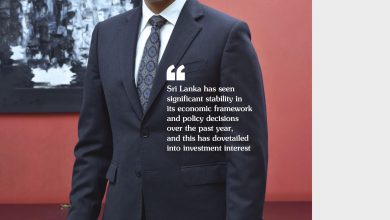 Sri Lanka is emerging from a troublesome period but its recovery appears to be somewhat promising with inflation stabilising, reserves improving and concerns about debt restructuring easing to some degree.
Sri Lanka is emerging from a troublesome period but its recovery appears to be somewhat promising with inflation stabilising, reserves improving and concerns about debt restructuring easing to some degree.
The former CEO of National Development Bank (NDB) Dimantha Seneviratne said that he “would consider this to be a recovery year,” adding that the focus should be on how we can progress to ensure that prosperity returns to Sri Lankans.
“That’s where banks have a big role to play as economic intermediaries, diverting funds from depositors to the needy sectors of the economy,” he asserted. Seneviratne affirmed that “we are optimistic about [Sri Lanka’s] revival and the banking sector is ready to support that growth.”
He cited several opportunities, beginning with the stabilisation of the economy, which offers “hope for corporates and SMEs to plan ahead.”
Sri Lanka’s trading sector is also witnessing a turning tide. Seneviratne elaborated: “Exports have done well compared to previous years. The government has recently relaxed some import controls so there will be booming activities on the import side, which is good news for traders.”
“The exchange rate has also stabilised… and that again is an opportunity,” he added.
Along with these opportunities, there are also several challenges and concerns for banks – notably, the management of non-performing loans.
He explained: “The banking sector is [still] looking at a 15 percent gross non-performing loans level. Customers are coming for negotiations and they see the pickup of trade so that’s one [positive] but we need to pay more attention to them. We must help them overcome challenges because most of these non-performing loans are not their fault – but because of the economic downturn as a whole.”
The sector is also affected by high staff turnover. Seneviratne noted: “Banks have seen quite a significant staff turnover – across the entire sector, turnover is in double digits and in some cases, it has risen to about 20 percent – that means a fifth of your staff is completely new.”
As he said, 40-50 percent of them have ventured overseas and the ensuing gaps have also provided opportunities for staff “to move around banks and other corporates.”
SME customers form another segment that the banking sector must focus on, he stressed: “SMEs are the backbone of the economy but they’re the first to be affected in an economic downturn because people’s paying and spending capacities are impacted, and the costs that you try to curtail are probably the areas that SMEs cater to.”
He pointed out that some industries have picked up while others are still struggling. “We need different tools to support them in their revival,” he urged, referring to the banking sector.
Seneviratne continued: “One of the key challenges SMEs face is that most of them are single entrepreneur or family-owned businesses. They have a business concept that they run with while probably not getting enough professional inputs to have a proper plan in place.”
Financial discipline is another critical gap for these enterprises to bridge. He noted that most Sri Lankan entrepreneurs do well but when other priorities – for instance, buying a luxury vehicle – come into play, their focus wanes.
“Another challenge is that most SMEs do not prepare their financials accurately so when these cannot be relied on, banks have another challenge [to manage],” he asserted.
The former CEO of NDB stated that the banking sector can provide advisory services given the wealth of expertise and experience gathered across various industries, and its access to industry insights, average margins, credit returns and other common issues.
“Sri Lankan entrepreneurs are quite determined and eager to look for opportunities, and make use of them,” Seneviratne surmised, concluding that what most SMEs need is good financial guidance and advice, which banks are geared to provide.




